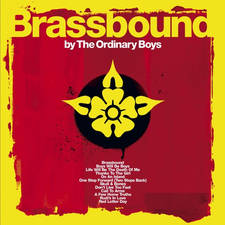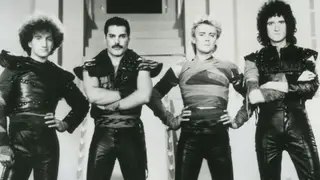Who was Elton John’s publisher Dick James and who plays him in Rocketman?
29 May 2019, 09:24 | Updated: 10 September 2019, 13:07
Controversy has surrounded the depiction of Elton John’s publisher in the 2019 biopic - but who was Dick James and why was he so important to the star’s success?
Rocketman is the story of Elton John and his rise to frame from his days as plain old Reg Dwight in Pinner to his superstardom in the 1980s.
Along the way, he meets a number of people who help him become a star: Bernie Taupin, whose lyrics Elton sets to music and John Reid, who became the singer’s manager and lover… until they fell out.
One of the other key characters in the film is Dick James, who signs John and Taupin to his music publishing company after hearing their compositions.

Who plays Dick James in the Rocketman film?
The part of Dick James is played by Stephen Graham, who is best known for his role as Combo in This Is England and its sequels. Born in Kirby on Merseyside in 1973, Graham also had parts in Snatch (as Tommy), the Pirates Of The Caribbean series (as Scrum) and the latest series of Line Of Duty.
However, Dick James’ son Stephen has strongly criticised the film’s portrayal of his father as a boorish, foul-mouthed Cockney, telling The Daily Express: They have turned him into this stereotype with a big fat cigar, swearing every other word.
"He just wasn't like that. He never got aggressive. He never lost his temper. He never swore. But that's how they have made him in the film.
"It's rather upset me because my father was a nice guy. Elton's own father had run off and wasn't around. He treated my father at the time as very much a father figure, and my father treated Elton very much as if he was a son.”
But who was Dick James and how did his career intertwine with not just Elton John’s… but also that of The Beatles?

Who was Dick James and how did he meet The Beatles?
Dick James was born Leon Vapnick in the East End of London in 1920, and spent much of his youth enjoying a career as a singer - in fact one of his biggest hits was performing the famous tune to The Adventures Of Robin Hood on ITV in the late 1950s. As fame faded, James discovered there was a thriving business to be made from music publishing.

As fate would have it, when Brian Epstein was looking for a permanent publisher for John Lennon and Paul McCartney’s blossoming career as songwriters - James suggested that Epstein form a new company with him: Northern Songs. It was this name that appeared on The Beatles’ second single, Please Please me - and all the subsequent Lennon/McCartney hits.
Thanks to his expertise managing The Beatles’ publishing, James soon found himself publishing Gerry And The Pacemakers, Billy J Kramer And The Dakotas, Herman’s Hermits, Matt Monro, The Troggs and many more.
When the Fab Four established their own company Apple, they were quite dismissive of the work of James, and when it appeared that days of The Beatles were numbered, James sold his shares in Northern Songs without consulting Lennon or McCartney. The musicians lost control of their own compositions - a situation which continues right up to this day.

How did Dick James meet Elton John?
As the 1960s turned into the 70s, James continued to manage his own publishing company and its associated label DJM Records (Dick James Music), which was founded in 1969.
As the Rocketman film shows, Elton John and Bernie Taupin became staff songwriters for Dick James, writing hits for artists like Lulu, Rod Stewart and even actor-turned-singer Edward Woodward.
Elton’s talent was spotted by Stephen James when he were caught using the in-house studio at Dick James music during downtime. He told the Express: “The melodies were good but the lyrics were terrible and I took the tapes to my father. He said you need a lyric writer and see how it works."

Dick and Stephen James nurtured the songwriting duo, and Stephen even suggested that Reg Dwight changed his name to Elton John.
Elton left DJM in 1974 to set up his own label, The Rocket Record Company, but he successfully took James to court in 1985 over royalties.
The stress of the court case affected James, and he died on 1 February 1986, aged 65. He suffered a heart attack during a game of cards with friends, which - according to legend - happened when the former publisher bent down to pick a card up from the floor.







